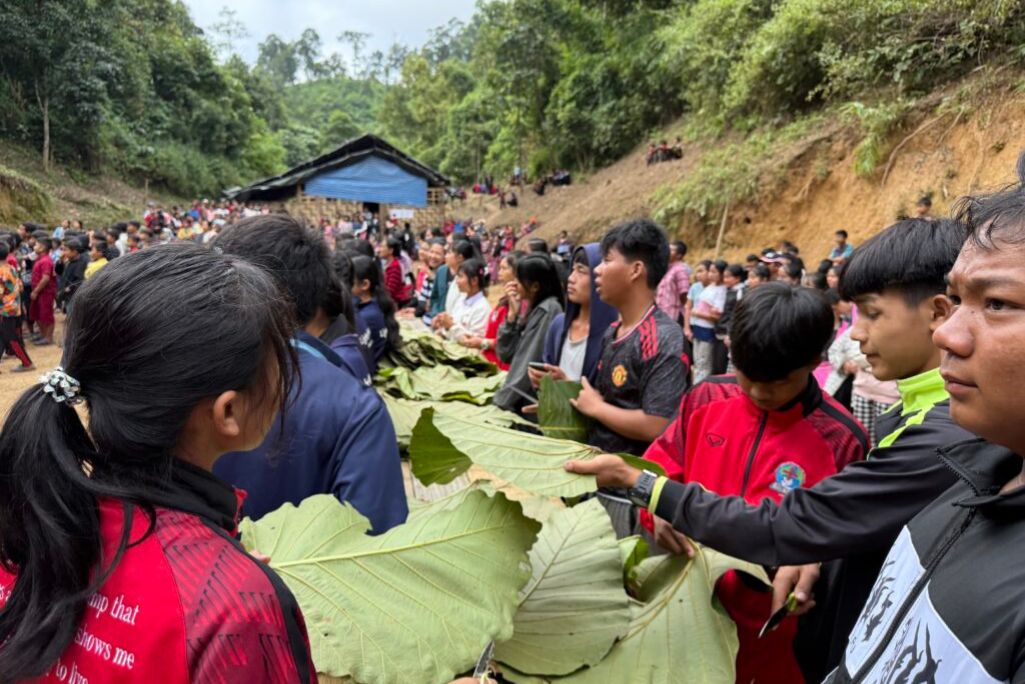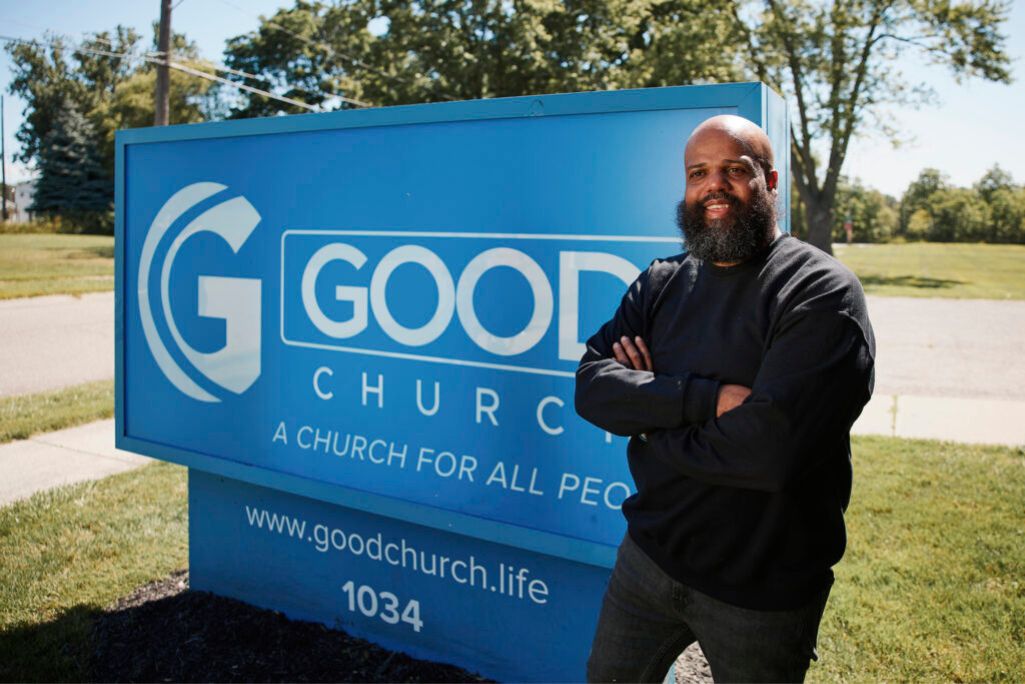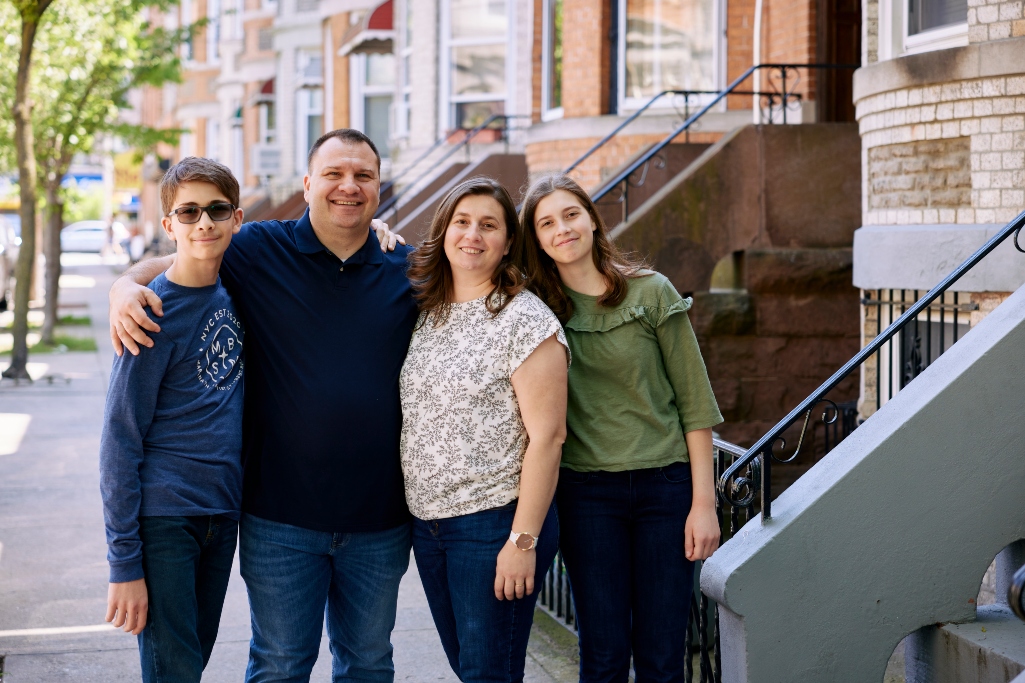
Members of Agape Myanmar Mission in San Diego have traveled to Myanmar regularly since 2019. This photo is of young people lining up for a meal in December 2024.
MANDALAY, Myanmar — The power is out here. So is water, telephone, internet in this city of 1.3 million people where 80% of the infrastructure (roads, bridges, power lines) have been destroyed and between 40% and 60% of the buildings damaged or destroyed by the 7.7 earthquake that struck Myanmar’s second-largest city and the region around it on March 28.
Tents are a major item needed for the thousands of people living outside during the hottest season of the year, from March to May. This spring there also are unseasonal rains, making everything unbearably hot and humid, adding irritation to people already dealing with trauma.
Somewhere between 10 and 20 refugee camps already are full in Myanmar, Thailand and India, where civil war survivors have taken refuge, so there is nowhere for earthquake survivors to go. Myanmar’s civil war started in 1962 and ramped up with a military coup in 2021 of the government then in power.
At least 3,600 bodies have been found so far in earthquake rubble. Others have not been found, and the stench of death is in the air. At least 4,500 people lay in makeshift “hospital” settings with a variety of injuries.
Water, rice, bedding, hygiene, medicine and medical supplies, flashlights and more are needed, but there’s a bottleneck for outside help from a wary government. Southern Baptists’ compassion ministry Send Relief works through local partners, most of whom have risen through cooperative work over the years.
“Our partners on the ground and local church leaders are already hard at work, serving their neighbors in the midst of this devastation,” said Jason Cox, Send Relief’s international vice president, in an article last week in Baptist Press. “Send Relief is providing resources to our local ministry partners who are urgently meeting survivors’ needs.”
Despite the devastation last fall with Hurricane Helene in the Appalachian Mountain states, and in the last week from the series of tornadoes and now flooding in the east-central part of the United States, it’s even worse in Myanmar. It’s fear on top of danger. It’s bombing and bullets as well as very limited water, food or shelter.
The Southern Baptist churches that are part of the Myanmar Baptist Fellowship in the United States are raising money and thinking about or planning on going to Myanmar this summer to share the gospel even as they serve as the hands and feet of Jesus.
“Our church’s vision is to plant a church in every village in Myanmar that doesn’t have a believer or a church,” Silas Thiang told Baptist Press. He’s pastor of Agape Myanmar Mission in San Diego, where about 50 people attend Sunday services. “We are raising funds to help the situation. They really need humanitarian help, but they need the gospel more. Burma is still a very strong Buddhist country.”
Agape San Diego has been going to Myanmar and Thailand since 2019. It supports five church planters in the Mandalay region, which is in central Myanmar. Agape San Diego ministers in Thailand to the perhaps 5 million people from Myanmar who fled their homeland because of the civil war that erupted in force in 2021 when the military overthrew the government. About 5 million fled to Thailand, where Agape San Diego leads twice a year in Bible and pastoral training.
“It’s the military people,” Thang “Moses” No told Baptist Press as the reason it’s so difficult to get people or humanitarian help into Myanmar. He’s pastor of Calvary Zoni Baptist Church in Indianapolis. Zoni is one of eight major people groups in the nation of 54 million people.
“Right now it is not allowed to go to Burma,” No said. “All foreigners not allowed.” This includes people born in Myanmar who hold a passport from another nation, such as the United States.”
“All” may be an exaggeration since news reports apparently show western journalists onsite, but those same news reports note the difficulty. “Critics say the country’s often-incompetent military government has delayed and restricted the arrival and distribution of crucial aid,” is the subhead of an April 7 article in the New York Times.
“(I)nternational relief is not reaching Myanmar’s beleaguered public as fast as it could,” according to the Times article. “They blame the junta for delays and restrictions on distributing aid. Others cite a climate of fear – the military has resumed airstrikes on rebel areas despite the cease-fire and on at least one occasion fired on aid workers.”
Calvary Zoni, where about 400 people mostly from the Zoni tribe attend Sunday services, is raising money to send to what most of them still call “Burma,” the former name of Myanmar. (The name was changed because Burma is the name of one of the tribes.) Calvary Zoni’s goal is $10,000. The money is to be given to churches and influential family members in Myanmar.
Jonathan Sui is pastor of Raleigh (N.C.) Chin Baptist Church, where about 90% of the 100 local Chin residents attend Sunday morning worship and Friday evening prayer services.
“No one is safe anywhere” in Myanmar, Sui told Baptist Press. In addition to the uncertainty of food, water and shelter, there is widespread concern about disease from unsanitary conditions and always the threat of getting caught in an unexpected battlefield.
“I don’t know what to do except prayer,” Sui said. Even though his family’s home in Myanmar wasn’t damaged, the building where his parents bought rice was destroyed, and there is no other nearby place to get rice, he said. “Every family (in the church) same [or similar situation]. We are not knowing how we can raise the money (to send to Myanmar). Every Friday we pray; we encourage.”
Hre Mang, executive director of the Myanmar Baptist Churches USA, a Southern Baptist fellowship, said most adults from Myanmar have family members in their homeland and have heard of the trauma they’re enduring. His sister and brother-in-law live in Mandalay where “the whole town was impacted. The government is very slow; they don’t have the tools to assess the damage.
“It’s really messy and scary,” Mang told Baptist Press. “The whole city is in chaos right now. It’s a very sad thing, very heart-broken.”
Most of the Myanmar Southern Baptist churches already have their own connection with a local church or missionary in Myanmar, Mang said. “We raise money quietly for civil war relief,” referring to the church he pastors, Falam Christian Church in Indianapolis. “Our church donates rice to a refugee camp, and we sponsor a missionary in Burma, as do many churches.”
A “good” salary for a pastor or missionary in Myanmar would be $200 to $300 a month, Mang said. An hourly wage might be $2. Before the earthquake, one kilo of rice cost $4 to $6. That would be enough for a family of four to have two meals.
“It is not a good time to go to Burma now,” Mang said. “If you were born in Burma, you are suspect, even if you have a good heart.
“Let’s mobilize prayer warriors to pray for the people of Myanmar while they suffer,” Mang said. “May God raise up spiritual awakening there.”
(EDITOR’S NOTE — Karen L. Willoughby is a national correspondent for Baptist Press.)


